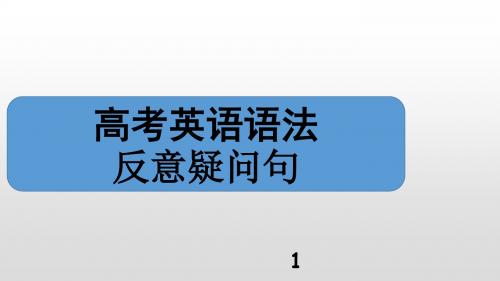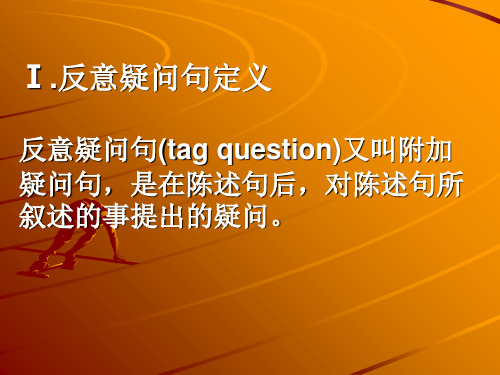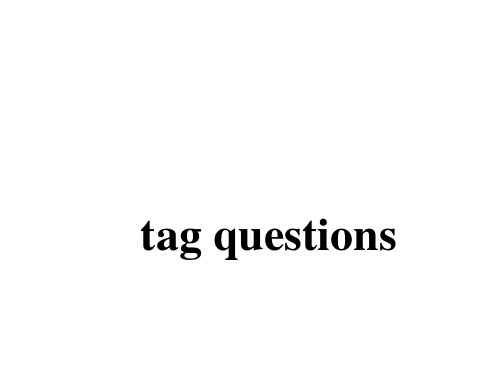反义疑问句PPT
合集下载
高考英语语法——反意疑问句(共11张PPT)

9
当陈述句部分含有主从复合句时,附加部分的代词和助动词 须与主句中的主谓保持一致。
You needn't do it since he has finished it, need you? It's the second time that you have sung that song, isn't it?
ome, shall we?
Let us go home, will you?
Open the door, will you?
5
need和dare既可以用作情态动词,又可以用作行为动词,所以在反意疑 问句中要准确判断其是情态动词还是行为动词。
He needn’t do it again, need he? He doesn’t need to do it again, does he? She dare say it, daren’t she? She doesn’t dare to say it, does she?
2
构成
The car is your father's, The girl doesn't sleep, The doctor can help you,
陈述句
isn't it? does she? can't he?
反意疑问句
be动词/情态动词/助动词 (not)+主语(代词)
3
前肯后否 前否后肯
He thinks that it will rain tomorrow, doesn't he? I think that it will rain tomorrow, won't it? They don't suppose that the film is moving, do they?
当陈述句部分含有主从复合句时,附加部分的代词和助动词 须与主句中的主谓保持一致。
You needn't do it since he has finished it, need you? It's the second time that you have sung that song, isn't it?
ome, shall we?
Let us go home, will you?
Open the door, will you?
5
need和dare既可以用作情态动词,又可以用作行为动词,所以在反意疑 问句中要准确判断其是情态动词还是行为动词。
He needn’t do it again, need he? He doesn’t need to do it again, does he? She dare say it, daren’t she? She doesn’t dare to say it, does she?
2
构成
The car is your father's, The girl doesn't sleep, The doctor can help you,
陈述句
isn't it? does she? can't he?
反意疑问句
be动词/情态动词/助动词 (not)+主语(代词)
3
前肯后否 前否后肯
He thinks that it will rain tomorrow, doesn't he? I think that it will rain tomorrow, won't it? They don't suppose that the film is moving, do they?
完整反义疑问句课件

如果陈述句是肯定的,反义疑问句应该是否定的。
2 人称一致
陈述句和反义疑问句中的主语和动词人称要保持一致。,避免使用复杂的句子结构。
结束语
通过学习反义疑问句的结构和用法,我们可以更好地理解和运用这个表达方 式,提升我们的语言表达能力。
完整反义疑问句PPT课件
PPT介绍反义疑问句
什么是反义疑问句?
反义疑问句是指一种用于提问或表示疑问的句子结构,通常由一个陈述句和一个反义疑问句构成。
反义疑问句的结构
1
陈述句部分
包含陈述句的主谓宾结构
2
反义疑问句部分
由一个助动词和一个否定词构成
3
连接词
连接陈述句和反义疑问句的部分,常用的连接词包括but和yet
反义疑问句的语气和语调
语气
反义疑问句通常用于表示疑问、请求或强调某 种认可的语气。
语调
反义疑问句通常以升调结尾,以引起对方的回 答或注意。
反义疑问句的用法与例句
询问意见
这个计划听起来很好,不是吗?
表示认可
你很喜欢这部电影,对吗?
确认信息
你不会去参加聚会,对吗?
反义疑问句的注意事项
1 肯定陈述,否定反义疑问
2 人称一致
陈述句和反义疑问句中的主语和动词人称要保持一致。,避免使用复杂的句子结构。
结束语
通过学习反义疑问句的结构和用法,我们可以更好地理解和运用这个表达方 式,提升我们的语言表达能力。
完整反义疑问句PPT课件
PPT介绍反义疑问句
什么是反义疑问句?
反义疑问句是指一种用于提问或表示疑问的句子结构,通常由一个陈述句和一个反义疑问句构成。
反义疑问句的结构
1
陈述句部分
包含陈述句的主谓宾结构
2
反义疑问句部分
由一个助动词和一个否定词构成
3
连接词
连接陈述句和反义疑问句的部分,常用的连接词包括but和yet
反义疑问句的语气和语调
语气
反义疑问句通常用于表示疑问、请求或强调某 种认可的语气。
语调
反义疑问句通常以升调结尾,以引起对方的回 答或注意。
反义疑问句的用法与例句
询问意见
这个计划听起来很好,不是吗?
表示认可
你很喜欢这部电影,对吗?
确认信息
你不会去参加聚会,对吗?
反义疑问句的注意事项
1 肯定陈述,否定反义疑问
新概念英语第三册反义疑问句课件

It must have rained last night, did’t it?
昨晚一定下雨了,是吗?
②主语+must have done, haven’t +主语?
(无明显过去的时间)
It must have rained, hasn’t it?
一定下雨了,是吗?
特别注意(2):ought to
There is a cup on the table, isn’t there?
桌上有一个杯子,不是吗,不是吗?
3.陈述部分主语为指示代词,疑问部分主语用it/they
This is a book, isn’t it?
this/that→it
这是一本书,不是吗?
These are your friends , aren’t they?
(be动词与主语保持一致)
He must be an actor, isn’t he?
他一定是个演员,不是吗? They must be friends, aren’t they? 他们一定是朋友,不是吗?
2.对过去的推测
①主语+must have done, didn’t +主语? (有明显过去的时间)
这谁也不怨,对不对?
Everyone is having a good time, aren’t they?
每个人都玩的很开心,不是吗?
5.陈述部分主语为复合不定代词(物)疑问部分主语 用it.
Everything is ready. Isn’t it ?
一切都准备好了。是吗?
something, anything,nothing, everything等
陈述部分ought to,疑问部分 should’t/oughtn’t He ought to know what to do, oughtn’t/shouldn’t he? 他应该知道该做什么,不是吗?
昨晚一定下雨了,是吗?
②主语+must have done, haven’t +主语?
(无明显过去的时间)
It must have rained, hasn’t it?
一定下雨了,是吗?
特别注意(2):ought to
There is a cup on the table, isn’t there?
桌上有一个杯子,不是吗,不是吗?
3.陈述部分主语为指示代词,疑问部分主语用it/they
This is a book, isn’t it?
this/that→it
这是一本书,不是吗?
These are your friends , aren’t they?
(be动词与主语保持一致)
He must be an actor, isn’t he?
他一定是个演员,不是吗? They must be friends, aren’t they? 他们一定是朋友,不是吗?
2.对过去的推测
①主语+must have done, didn’t +主语? (有明显过去的时间)
这谁也不怨,对不对?
Everyone is having a good time, aren’t they?
每个人都玩的很开心,不是吗?
5.陈述部分主语为复合不定代词(物)疑问部分主语 用it.
Everything is ready. Isn’t it ?
一切都准备好了。是吗?
something, anything,nothing, everything等
陈述部分ought to,疑问部分 should’t/oughtn’t He ought to know what to do, oughtn’t/shouldn’t he? 他应该知道该做什么,不是吗?
反义疑问句归纳总结.ppt

The Swede made no answer, did he / she? Some plants never blown, do they ?
There are few apples in the basket, are there?
He can hardly swim, can he?
They seldom come late, do they?
He is not the man who gave us a talk, is he? He said he wanted to visit Japan, didn't he?
c. 上述部分主句谓语是I ;we think, believe, expect, suppose, imagine 等引 导的宾语从句,疑问部分与宾语从句相 对应构成反意疑问句。
to you in English, does she? She rarely speaks
4)含有ought to 的反意疑问句,陈述 部分是肯定的,疑问部分用shouldn't / oughtn't +主语。
He ought to know what to do, oughtn't he? / shouldn't he?
Either you or he is right,_is_n_’_t_h_e_?
13)陈述部分主语是指示代词或不定代 词 everything, that, this nothing, 疑问 部分主语用 it 。
Everything is ready, isn't it?
14)陈述部分为主语从句或并列复合句, 疑问部分有三种情况s Mr. Smith had been to Beijing for several times, he should have been in China now, shouldn't he?
There are few apples in the basket, are there?
He can hardly swim, can he?
They seldom come late, do they?
He is not the man who gave us a talk, is he? He said he wanted to visit Japan, didn't he?
c. 上述部分主句谓语是I ;we think, believe, expect, suppose, imagine 等引 导的宾语从句,疑问部分与宾语从句相 对应构成反意疑问句。
to you in English, does she? She rarely speaks
4)含有ought to 的反意疑问句,陈述 部分是肯定的,疑问部分用shouldn't / oughtn't +主语。
He ought to know what to do, oughtn't he? / shouldn't he?
Either you or he is right,_is_n_’_t_h_e_?
13)陈述部分主语是指示代词或不定代 词 everything, that, this nothing, 疑问 部分主语用 it 。
Everything is ready, isn't it?
14)陈述部分为主语从句或并列复合句, 疑问部分有三种情况s Mr. Smith had been to Beijing for several times, he should have been in China now, shouldn't he?
反义疑问句详细讲解课件(PPT27张)

I don’t believe he has finished his work.
7.当陈述部分的主句是I think (expect, believe)等结构时,反 意疑问句的附加部分则往往与从 句中的主语和谓语动词保持对应 关系,但要注意否定的转移。 例如:
I think he’s funny, isn’t he? I don’t believe she likes my
You must have seen the film last week, didn’t you?
6. 当陈述部分是I am…时,反意疑 问句部分通常要用aren’t I;如陈述 句部分的主语是I am not时,反意疑 问句部分通常要用am I。 例如:
1)I am a teacher, aren’t I?
Ⅰ.反意疑问句定义
反意疑问句(tag question)又叫附加 疑问句,是在陈述句后,对陈述句所 叙述的事提出的疑问。
Ⅱ.基本结构:
陈述句+逗号+简短的一般疑问句?
遵循前肯定后否定前否后肯式的原则
①前肯后否式。例如:
You are all students, aren’t you﹖
②前否后肯式。例如:
Let’s have a rest, shall we? 以let us开头的祈使句,不包括 说话人在内,因此反意疑问句的 附加部分用will you。例如:
Let us stop now, will you?
Ⅳ. 反意疑问句的回答 “ 根据事实回答”
对反意疑问句的回答,无论问题的提法如何,如果 事实是肯定的,就用yes,事实是否定的,就要用no。 要特别注意陈述句部分是否定结构,反意疑问句部分 用肯定式提问时,回答yes或no与汉语正好相反。这 种省略回答的yes要译成“不”,no要译成“是”。
7.当陈述部分的主句是I think (expect, believe)等结构时,反 意疑问句的附加部分则往往与从 句中的主语和谓语动词保持对应 关系,但要注意否定的转移。 例如:
I think he’s funny, isn’t he? I don’t believe she likes my
You must have seen the film last week, didn’t you?
6. 当陈述部分是I am…时,反意疑 问句部分通常要用aren’t I;如陈述 句部分的主语是I am not时,反意疑 问句部分通常要用am I。 例如:
1)I am a teacher, aren’t I?
Ⅰ.反意疑问句定义
反意疑问句(tag question)又叫附加 疑问句,是在陈述句后,对陈述句所 叙述的事提出的疑问。
Ⅱ.基本结构:
陈述句+逗号+简短的一般疑问句?
遵循前肯定后否定前否后肯式的原则
①前肯后否式。例如:
You are all students, aren’t you﹖
②前否后肯式。例如:
Let’s have a rest, shall we? 以let us开头的祈使句,不包括 说话人在内,因此反意疑问句的 附加部分用will you。例如:
Let us stop now, will you?
Ⅳ. 反意疑问句的回答 “ 根据事实回答”
对反意疑问句的回答,无论问题的提法如何,如果 事实是肯定的,就用yes,事实是否定的,就要用no。 要特别注意陈述句部分是否定结构,反意疑问句部分 用肯定式提问时,回答yes或no与汉语正好相反。这 种省略回答的yes要译成“不”,no要译成“是”。
完整反义疑问句课件

04
反义疑问句的回答
肯定回答
要点一
肯定回答时,通常使用“Yes”来 回答反义疑问句,并重复…
You like apples, don’t you? 回答:Yes, I do.
要点二
如果对反义疑问句中的否定部分 进行强调,可以使用“Yes…
You didn’t go to the party, did you? 回答:Yes, I did.
详细描述
反义疑问句是一种常见的语法结构,通常用于表达说话者的 态度、观点或对某件事情的疑问。它的特点是前半部分是一 个肯定或否定的陈述句,而后半部分则通过疑问的形式表达 相反的意思。
类型
总结词
反义疑问句可以分为两种类型,即标准反义疑问句和非标准反义疑问句。
详细描述
标准反义疑问句的前半部分是一个肯定句,后半部分是一个否定疑问句;或者 前半部分是一个否定句,后半部分是一个肯定疑问句。而非标准反义疑问句则 不遵循这一规则,前后两部分没有明显的相反意思。
总结词
表示某些特殊情况或特殊用法,需要特 别注意。
VS
详细描述
在某些特殊情况下,反义疑问句的用法可 能会发生变化。例如,当陈述句为祈使句 时,反义疑问句通常会省略主语;当陈述 句为感叹句时,反义疑问句通常会省略疑 问词。此外,还有一些特殊的反义疑问句 结构,如“他不是学生吗?”等,需要特 别注意其用法和含义。
否定回答
要点一
否定回答时,可以使用“No”来 回答反义疑问句,并重复疑…
You don’t like coffee, do you? 回答:No, I don’t.
要点二
如果对反义疑问句中的肯定部分 进行强调,可以使用“No,…
You went to the concert, didn’t you? 回答:No, I didn’t.
反义疑问句(共14张PPT)全

二、前否+后肯
1.She wasn’t ill last week, was she ? 2.It doesn’t often rain here, does it? 3.Tom won’t go to Shanghai next year,
will he ?
特殊用法1—祈使句的反义疑问句
1、肯定祈使句的反意疑问句,疑问部分用will you或won’t you,否定祈使句则用will you ? 如: Don't do that again, will you? Go with me, will you / won't you?
13、He who seize the right moment, is the right man.谁把握机遇,谁就心想事成。2024/10/172024/10/172024/10/172024/10/1710/17/2024 +14、谁要是自己还没有发展培养和教育好,他就不能发展培养和教育别人。2024年10月17日星期四2024/10/172024/10/172024/10/17 +15、一年之计,莫如树谷;十年之计,莫如树木;终身之计,莫如树人。2024年10月2024/10/172024/10/172024/10/1710/17/2024 +16、教学的目的是培养学生自己学习,自己研究,用自己的头脑来想,用自己的眼睛看,用自己的手来做这种精神。2024/10/172024/10/17October 17, 2024 +17、儿童是中心,教育的措施便围绕他们而组织起来。2024/10/172024/10/172024/10/172024/10/17
一 、前肯+后否 含be动词
1.He is a doctor, isn’t he? 2.I am Chinese, aren’t I?
初中英语《反义疑问句》ppt课件

2) 陈述部分的谓语是wish,疑问部分要用may +主语。 I wish to have a word with you, may I ?
3) 陈述部分用 no, nothing, nobody, never, little , few,seldom, hardly, 等否定含义的词时,疑问部分用 肯定含义。
6 . The boys can swim,___________? 7. Your father will be back in a week, 5
(二)行为动词(当陈述句的谓语是行为 动词时,用don’t ,doesn’t , didn’tains here, ___d_o_e_s_n_’_t _i_t ? 2. You have a headache, ___d_o_n__’t __y_o?u 3. I called you yesterday, ___d_i_d_n_’t__?I
6)陈述部分由neither… nor, either… or 连接的并列主 语时,疑问部分 根据其实际逻辑意义而定。
Neither you nor I am engineer, are we ?
10
Let’s check up!
4)We have to get ther.e at eight tomorrow, don't we? 5)He must be a doctor, isn't he?
9
4)陈述部分有have to +v. (had to + v.),疑问部分常用 don’t +主语(didn‘t +主语)。 We have to get there at eight tomorrow, don't we ?
3) 陈述部分用 no, nothing, nobody, never, little , few,seldom, hardly, 等否定含义的词时,疑问部分用 肯定含义。
6 . The boys can swim,___________? 7. Your father will be back in a week, 5
(二)行为动词(当陈述句的谓语是行为 动词时,用don’t ,doesn’t , didn’tains here, ___d_o_e_s_n_’_t _i_t ? 2. You have a headache, ___d_o_n__’t __y_o?u 3. I called you yesterday, ___d_i_d_n_’t__?I
6)陈述部分由neither… nor, either… or 连接的并列主 语时,疑问部分 根据其实际逻辑意义而定。
Neither you nor I am engineer, are we ?
10
Let’s check up!
4)We have to get ther.e at eight tomorrow, don't we? 5)He must be a doctor, isn't he?
9
4)陈述部分有have to +v. (had to + v.),疑问部分常用 don’t +主语(didn‘t +主语)。 We have to get there at eight tomorrow, don't we ?
《反义疑问句》课件

提供一些实际例子,引导听众分析和理解反义疑问句的适用场景。
2
练习及反馈
设计题目供听众练习反义疑问句的运用,并提供实时反馈和解析。
结语
反义疑问句的重要性和使用 价值
总结反义疑问句在语言表达中的重要性和应 用价值。
希望大家能够运用反义疑问 句更好地沟通交流。
什么是反义 疑问句?
解释反义疑问句的 定义和作用,引起 听众的兴趣和好奇。
反义疑问句 的组成结构
解析反义疑问句的 构成要素,加深理 解和记忆。
反义疑问句 的附加疑问 部分形式
介绍反义疑问句中 常见的附加疑问部 分形式,提供实例 加深印象。
反义疑问句 的特点与注 意事项
探讨反义疑问句的 独特特点和注意事 项,帮助听众正确 运用。
《反义疑问句》PPT课件
反义疑问句PPT课件,通过精心设计的幻灯片,详细阐述反义疑问句的基本 语法与使用场景,帮助大家更好地运用反义疑问句进行沟通交流。
概述
基本语法与特点
掌握反义疑问句的基本语法和特点,提高语 言表达的灵活性。
使用场景
了解反义疑问句的应用场景,拓宽交流和表 达的方式。
反义疑问句的基本语法与特点
反义疑问句的使用场景
常见的反义疑问句应用 场景
反义疑问句在交流中的 作用
列举常见的日常对话和情境, 逐一讲解如何使用反义疑问句。
阐述反义疑问句在有效沟通中 的作用和价值,引发思考和一些技 巧和注意事项,提高语言表达 的准确性。
练习与实践
1
反义疑问句实例分析
反义疑问句课件

They had to cross the busy street, didn’t they?
特殊用法11
陈述部分的谓语是used to 时,疑问部分用 didn't +主语或 usedn't +主语。
He used to take pictures there, didn't he?
She used to stay up late, usedn’t she?
---祈使句
1. Sit down please, _w__il_l_/_w__o_n_’_t _y_o_u_ ? 2. Please call me, __w_i_ll__/ _w_o_n__’t_y__o_u__? 3. Let’s go home, _s_h_a__ll_w__e________ ? 4. Let us go home, _w__il_l_/_w__o_n_’_t _y_o__u_ ? 5. Don’t leave now, __w_i_ll_y_o__u________?
反义疑问句
(The tag question)又叫附加疑 问句。它表示提问人的看法,没 有把握,需要对方证实。
反意疑问句由“陈述句+简略疑问句”两部分组成,第一部分 提出一种看法,第二部分用来质疑或表示证实。附加疑问句 部分常为:be动词/助动词/情态动词+主语
反意疑问句/ 附加疑问句--规则: 陈述句+附加问句
He would rather read it ten times than recite it, wouldn't he?
特殊用法14
陈述部分有You'd like to + v. 疑问部分用wouldn't +主语。
特殊用法11
陈述部分的谓语是used to 时,疑问部分用 didn't +主语或 usedn't +主语。
He used to take pictures there, didn't he?
She used to stay up late, usedn’t she?
---祈使句
1. Sit down please, _w__il_l_/_w__o_n_’_t _y_o_u_ ? 2. Please call me, __w_i_ll__/ _w_o_n__’t_y__o_u__? 3. Let’s go home, _s_h_a__ll_w__e________ ? 4. Let us go home, _w__il_l_/_w__o_n_’_t _y_o__u_ ? 5. Don’t leave now, __w_i_ll_y_o__u________?
反义疑问句
(The tag question)又叫附加疑 问句。它表示提问人的看法,没 有把握,需要对方证实。
反意疑问句由“陈述句+简略疑问句”两部分组成,第一部分 提出一种看法,第二部分用来质疑或表示证实。附加疑问句 部分常为:be动词/助动词/情态动词+主语
反意疑问句/ 附加疑问句--规则: 陈述句+附加问句
He would rather read it ten times than recite it, wouldn't he?
特殊用法14
陈述部分有You'd like to + v. 疑问部分用wouldn't +主语。
英语语法反义疑问句ppt

祈使句的反意疑问句
肯定的祈使句:won’t you ? / will you ? 祈使句的反意疑问句
否定的祈使句:will you ? 注:Let’s … , shall we?
Let us…, will you? e.g. Let us go to watch the movie, will you ? Let’s walk to the shops instead of taking the car, shall we ? Don't play computer games, will you?
B. is she
C. did she C. hasn’t he C. did she C. don’t they C. hasn’t she
D. wasn’t she D. doesn’t he D. didn’t she D. will they D. has she
6. There won’t be any concert this Saturday evening, C ?
A. will there not
B. will there C. is there
D. won’t there
7. He dislikes the two subjects, B he?
A. does
B. doesn’t
C. is
8. Let’s go there by bus, B ?
D. isn’t
特殊的反意疑问句
特殊的反意疑问句: (1) 主+ used to do sth, didn't/usedn't+主?
She used to get up at 7 o'clock, didn't/usedn't she ?
反义疑问句(25张PPT)初中英语专项复习课件

Yes, they were.
【典例1】John had a short walk after lunch, _______?
A. did he
B. didn't he
C. had he
D. hadn't he
考查反义疑问句。反义疑问句遵循的原则为“前肯,后否;前否,后 肯”,得出疑问句部分为否定形式。陈述句部分为一般过去时,需用 助动词did来反问,故答案选B。
No, she hasn’t.
易错点2
常见时态的反义疑问句
一 般 过 去 时
She wasn’t at home, _w_a_s_s_h_e_? No, she wasn’t.
易错点2
常见时态的反义疑问句
一 般 过 去 时
They weren’t in the park last Sunday, _w_e_r_e_t_h_e_y_?
前肯 前否
后否 后肯
“是吗?” “是不是?” “这是真的吗?” “你同意吗?”
注意
附加疑问句= be、助动词、情态动词+人称代词主格
易错点1
反义疑问句的回答
Yes, 主语 + be动词/情态动词/助动词 No,主语 + be动词/情态动词/助动词 + not
易错点2
常见时态的反义疑问句
一 般 现 在 时
反义疑问句的特殊用法 祈使句的反义疑问句
反义疑问句的特殊用法
1
2
3
陈述句部分含 有否定意义的 词。
陈述部分主语
陈述部分是I am
或 I’m 。
是this, that ,
these, those时。 Nhomakorabea反义疑问句的特殊用法 1
【典例1】John had a short walk after lunch, _______?
A. did he
B. didn't he
C. had he
D. hadn't he
考查反义疑问句。反义疑问句遵循的原则为“前肯,后否;前否,后 肯”,得出疑问句部分为否定形式。陈述句部分为一般过去时,需用 助动词did来反问,故答案选B。
No, she hasn’t.
易错点2
常见时态的反义疑问句
一 般 过 去 时
She wasn’t at home, _w_a_s_s_h_e_? No, she wasn’t.
易错点2
常见时态的反义疑问句
一 般 过 去 时
They weren’t in the park last Sunday, _w_e_r_e_t_h_e_y_?
前肯 前否
后否 后肯
“是吗?” “是不是?” “这是真的吗?” “你同意吗?”
注意
附加疑问句= be、助动词、情态动词+人称代词主格
易错点1
反义疑问句的回答
Yes, 主语 + be动词/情态动词/助动词 No,主语 + be动词/情态动词/助动词 + not
易错点2
常见时态的反义疑问句
一 般 现 在 时
反义疑问句的特殊用法 祈使句的反义疑问句
反义疑问句的特殊用法
1
2
3
陈述句部分含 有否定意义的 词。
陈述部分主语
陈述部分是I am
或 I’m 。
是this, that ,
these, those时。 Nhomakorabea反义疑问句的特殊用法 1
英语中的反意疑问句PPT精品课件

或 usedn't + 主语。
He used to take pictures there, didn't he? / usedn't he? 7) 陈述部分有had better + v. 疑问句部分用hadn't you?
You'd better read it by yourself, hadn't you? 8) 陈述部分有would rather +v.,疑问部分多用 wouldn't +主语。
Let’s do some exercises
5). We have to get there at eight tomorrow,_______? 6). He used to take pictures there, ______________? 7).You'd better read it by yourself, _________?
14 ) Mr. Smith had been to Beijing for several times; he should have been in China then, shouldn't he? I don't think he is bright, is he? We believe she can do it better, can't she?
Let’s look at the key and check how many you’v
done right!
Let’s see the key
1). I'm as tall as your sister,aren't I?
2). I wish to have a word with you, may I? 3). Some plants never blown (开花), do they ? 4). He ought to know what to do, oughtn't he?
He used to take pictures there, didn't he? / usedn't he? 7) 陈述部分有had better + v. 疑问句部分用hadn't you?
You'd better read it by yourself, hadn't you? 8) 陈述部分有would rather +v.,疑问部分多用 wouldn't +主语。
Let’s do some exercises
5). We have to get there at eight tomorrow,_______? 6). He used to take pictures there, ______________? 7).You'd better read it by yourself, _________?
14 ) Mr. Smith had been to Beijing for several times; he should have been in China then, shouldn't he? I don't think he is bright, is he? We believe she can do it better, can't she?
Let’s look at the key and check how many you’v
done right!
Let’s see the key
1). I'm as tall as your sister,aren't I?
2). I wish to have a word with you, may I? 3). Some plants never blown (开花), do they ? 4). He ought to know what to do, oughtn't he?
反义疑问句课件

特殊使用方法2 情态动词旳反义疑问句
• 1) He can play the piano,_c_a_n_’t_h_e___? • 2) He should go right now, _s_h_o_u_ld_n_’_t_h_e? • 3)They can’t finish it, _c_a_n_t_h_e_y____?
其他动词:
1. You will go to America, w__o_n_’_t_ y_o__u ? 2. We have ever been to Shanghai,
__h_a_v_e_n__’t_ __w_e___ ?
特殊使用方法1 ---祈使句旳反意疑问句:
陈说句为 “Let’s…” 构造时, 表达提议,其意思 涉及对方,即“让我们(你我双方)”附加问句一 般用 “shall we?” 。
• I don’t think they are friends, are they?
Jay sings many songs, doesn’t he ? Yes, he does.
Lily was ill in bed, _w_a_s_n_’t_s_he__?
Yes, she was.
She wasn’t at home, _w_as__sh_e__?
No, she wasn’t.
特殊使用方法3---There be句型旳反意疑问句。
陈说句为There be构造时,附加问句仍用there。
• 1.There is a famous doctor in your hometown,
__is_n__’t__t_h_e_r_e___?
Yes, there is.
• 2.There will not be any classes tomorrow,
- 1、下载文档前请自行甄别文档内容的完整性,平台不提供额外的编辑、内容补充、找答案等附加服务。
- 2、"仅部分预览"的文档,不可在线预览部分如存在完整性等问题,可反馈申请退款(可完整预览的文档不适用该条件!)。
- 3、如文档侵犯您的权益,请联系客服反馈,我们会尽快为您处理(人工客服工作时间:9:00-18:30)。
含有un,in,im,dis,-less等否定意义的前缀 或后缀单词,陈述部分仍表示肯定
否定式
It’s unfair, isn't it?
1)陈述句式反意疑问句
1. E-mail is very popular today. People seldom write letters now, ______? 2. Bob, you watched the fashion show last night, ___ ? 3. Millions of people know about Susan Boyle
当谓语动词是否定形式
肯定式
有no, never, little, seldom,hardly, scarcely, few, nothing, nobody等否定或半否定词时
肯定式
You don't come from England, do you?
He could hardly speak English three years ago,could he?
陈述部分
含有un,in,im,dis,-less等否定意义的 前缀或后缀单词,陈述部分仍表示
肯定
附加疑问部分 使用否定形式
1)陈述句式反意疑问句
陈述部分 肯定式 I am
I wish
疑问部分 否定式 aren't I ?
may I ?
例句
It's a nice day, isn't it? I'm as tall as your sister, aren't I? I wish I were you,may I ?
陈述部分
疑问部分
mustn't表示“禁止,不可, 不必”时
must
例句
You mustn't stop your car here,must you?
must表示“有必要”时
needn't
They must finish the work today,needn't they?
当must用来表示对现在的 根据must后面的动词采用相应
I am your friend ,__a_re_n_'_t I___? I wish I were you,__m__a_y _I___?
陈述部分
肯定式 I am I wish
疑问部分
否定式 aren't I ? may I ?
(2) 陈述部分是否定的, 疑问部分是肯定的。
1.They didn’t find any living things therdei,d_t_h_e_y? 2.No tractors are working in the fields,_a_r_e_t_he_y? 3.Little progress has been made,__h_as__it__?
如果must+have done强调动
Your daughter must have
作的完成(一般没有明确 要用“haven't/hasn't+主语”。 been to Africa, hasn't
的过去时间状语),
she ?
You must be tired , _ar_e_n’_t _yo_u___ ?
2) 祈使句式反意疑问句
Let’s go homes,_h_al_l_w_e__? Let us go,__w__il_l _yo_u__? Let me go,_w__il_l _y_ou__? Come here please, __w_i_ll_y_o_u__? Never ask her again,_w__il_l /_c_a_n__y_ou__?
前后主语一致(一般情况) (1)人称一致 (2)助动词一致 (3)时态一致 *You've already got our
invitation,_h_a_ve_n_'t_y_ou__? *He didn't attend the meeting , _d_id__he__?
有如下几种句式:
1)陈述句式反意疑问句 She likes the idea,d_o_e_s_n'_t _sh_e_?
情况进行推测时
的形式
当must+have done表示对过 去的情况进行推测(一般 句中有明确的过去时间状 语)
根据陈述部分谓语的情况用 “didn't+主语”或 “wasn't/weren't+主语”;
He must be good at English,isn't he?
She must have read the novel last week,didn't she?
Your daughter must have been to
Africa, _h_as_n_’t_sh_e__?
You must have gone to the cinema
yesterday, _d_id_n_’t_y_ou___?
There be句型
There be 句型中,反义疑问部分必须为be
You’d better go there instead of me___________ ? He’d rather not go there tomorrow________? He would like to go there today,_________ ?
当陈述部分有情态动词must
动词 + there
There are some apples in the basket, aren't there? There isn't any milk left, is there?
There won’t be any trouble, ____will
there_______? there引导的陈述句,疑问部分仍用there。
语
there, didn't he? / usedn't he?
had better(最好) + v.
hadn't you?
would rather(宁可、宁愿) +v.
wouldn't +主语
You'd like to +v.
wouldn't +主语
You'd better read it by yourself, hadn't you?
主从复合句式反意疑问句
1. You think I’m wrong, ______ ? 2. I believe they haven’t come, _____ ? 3. I suppose you’re not going today, __? 4. I don’t think he is right, _________? 5. I suppose that he isn’t right,_________? 6. He thought that Tom was right,_______?
规律:祈使句的反意疑问句,除Let’s开头的句 子以外,其他句子的疑问部分一律用will you即可
1. Let's go out for a walk, ______? 2. Let us go out for a walk, ______? 3. Turn on the radio, ______? 4. Let's discuss it after the meeting,______ ? 5. -Are you going to the picnic with us tonight?
陈述部分有情态动词
陈述部分
疑问部分
例句
have to +v. (had to + v.)
don't +主语(didn't +主语)
We have to get there at eight tomorrow, don't we?
used to
didn't +主语或 usedn't +主 He used to take pictures
3) 关于陈述部分的主语和疑问 部分的主语一致问题
陈述部分主语
不定代词everyone,no one, nobody everything,anything,nothing,som ething, this,that one
疑问部 分主语
he/they
it one/he
例句
Everyone is in the classroom, aren't they? Everything goes well, does it? This is your book, isn't it? One can't be always young,can one?
陈述部分
疑问部分
一般主从复合句
根据主句的谓语而定
I /we+think, believe, suppose, imagine, expect+宾语从句
问句应与从句相一致
I /we+ don't + think, believe, suppose, imagine, expect+宾语从句
从句主谓一致,且用肯定形式
He would rather read it ten times than recite it, wouldn't he?
You'd like to go with me, wouldn't you?
